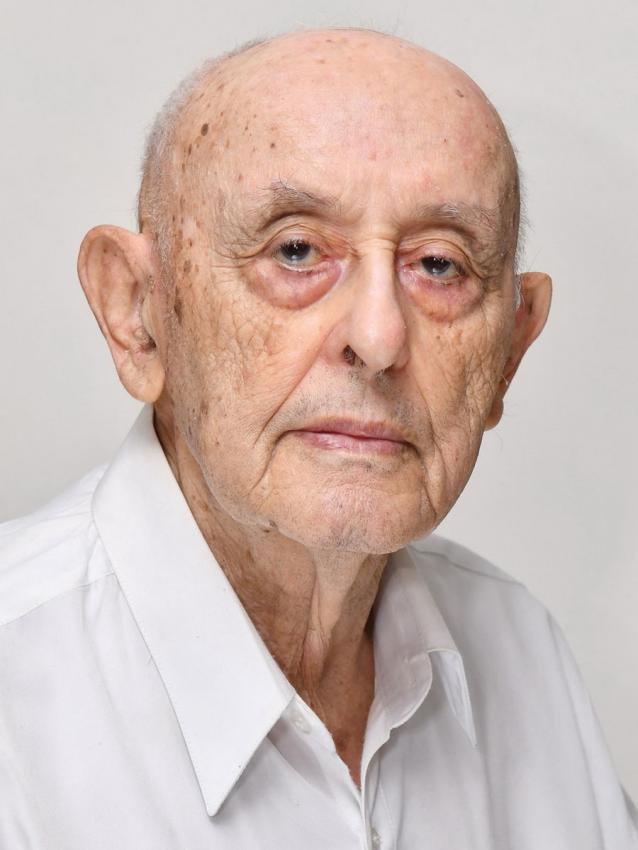Arie Shilansky lit one of six torches at the State Opening Ceremony of Holocaust Remembrance Day at Yad Vashem in 2022.
Arie Shilansky was born in 1928 in the town of Siauliai, Lithuania, to a Zionist family, the youngest of four children. His father, Yosef Zvi Shilansky, died when he was born.
In June 1941, the Germans invaded and occupied Lithuania. A few weeks later, a ghetto was established in Siauliai, and Arie and his family were imprisoned there. "In the ghetto, we lived a life of hunger and humiliation," Arie later recalled. "I remember the horror of the public hanging of Bezalel Mazowiecki, who tried to smuggle food and cigarettes."
On 5 November 1943, the children's Aktion began in the ghetto. "My sister Chana came running, and said, 'Run to the Frenkel factory!' We fled the ghetto. The Jewish foreman of the factory quickly put us in a warehouse, hid the door behind an iron cabinet and told me: 'There are fifteen young children here. You are the oldest. Make sure there is complete silence so that they do not discover you.' I told them stories in order to keep them quiet. When people returned to the ghetto from work and found out that their children had been abducted, we heard terrible cries of anguish. Women tore their hair and banged their heads against the wall. The cry that reverberated in the ghetto resonates to this day."
In July 1944, with the approach of the Red Army, the ghetto was evacuated and its prisoners sent west. Among them was Arie, who, after several days of terrible overcrowding in a cattle car, arrived at the Stutthof concentration camp in northeastern Poland. "Within a minute, I was separated from the family and left alone. We were forced to undress. Everyone was shaved." Food was scarce and the prisoners were routinely beaten.
"Only people who were suitable for a task were taken to work, certainly not boys like me. But we all wanted to live, so we would try to join the ranks of the adults. We understood that whoever went to work would survive."
The guards would take Arie out of the ranks of the workers and beat him severely as punishment for joining them. Arie finally managed to join a group of workers who were transported to one of the sub-camps of Dachau in Germany, where he was assigned to forced labor. In early 1945, he was transferred to the Landsberg camp, where he found his brother, Dov. As the Allies approached, the prisoners, including the two brothers, were forced on a death march.
"On 1 May 1945, we were led, in heavy snow, to spend the night between two mountains. SS men positioned themselves around us with machine guns. We thought they were going to kill us. In the morning when we awoke, we realized that the SS men were gone. In the distance we heard loud noises. Americans. That was the moment of liberation. "
After his release, Arie was reunited with his mother, Lea, and sisters, Chana and Chaya. He was taken to a hospital housed in the St. Ottilien Abbey in Germany. A delegation of the Jewish Brigade arrived at the monastery.
"It was a surprise. We did not believe that there were Jews left in the world. They promised that they would soon come again and take us to the Land of Israel. This goal gave us strength."
Some two weeks later, the Brigade's soldiers transferred Arie to Italy. In February 1948, he immigrated to Eretz Israel (Mandatory Palestine) and fought in the War of Independence.
Arie and Ruth have three children, six grandchildren and five great-grandchildren.


